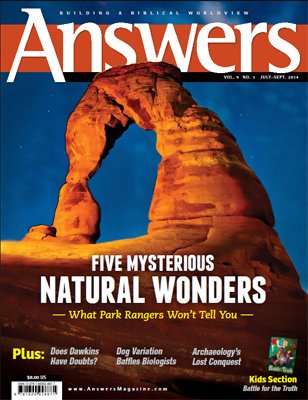Readers Respond
Thanks for offering such a great magazine. It makes a difference and certainly brings glory to God.
Larry H., Lawrenceburg, Indiana
Visiting Heaven
This is the first time an article in your magazine left me very disappointed after reading it.
Janet S., Wallenstein, Ontario, Canada
I was very disappointed to read “Are Visits to Heaven for Real?” I have loved Ken Ham and Answers magazine for years. However, I have to disagree with the views of the author of that article, and I know everyone else I’ve talked to about it disagrees as well.
Angela E., Concord, North Carolina
It greatly upsets me to have to read such nonsense in your magazine which I have enjoyed for the past year.
Marilyn W., Golden, Colorado
I have read the Burpos’ book and others and have found them to be intriguing. I see no reason to declare them all to be illegitimate, as your author suggests. The Bible says, “Your young men will see visions and your old men will dream dreams.”
Sally N., Smethport, Pennsylvania
Assuming the vision of heaven was real, of course it was from a child’s viewpoint. God speaks to us in our immaturity of the moment, not as we will be 20 years from now. God is the perfect communicator.
Yvonne H., Sun City, Arizona
Perhaps the Spirit of God chooses to use near-death experiences to show us more about death and the glory of heaven. I believe we need to be careful about making such strong statements about a subject that we know little about. We need to give room for God to comfort His people in whatever way He chooses.
Sam E., Butler, Indiana
Author’s Response: Many of the questions critics have raised are addressed in the author’s book The Glory of Heaven. The limitations of a magazine article make it impossible to address every likely question or objection specifically.
In John 3:13 Jesus insisted that no one has ascended to heaven in such a way as to return and talk about heavenly things (cf. 2 Corinthians 12:1–4). Only He had His permanent abode in heaven prior to His incarnation and, therefore, only He has the true knowledge regarding heavenly wisdom (cf. Proverbs 30:4).
Or, more succinctly, in theologian John Gill’s words, the “meaning is, that no man had, or could go up to heaven, to bring from thence the knowledge of divine and heavenly things.”
Likewise, the clear principle underlying 1 Corinthians 4:6 is, “Do not go beyond what is written
.”
What these replies show is how deeply ingrained in today’s evangelicals is the desire to have knowledge that goes “beyond what is written.” That thirst for knowledge that God’s Word doesn’t reveal is an even greater problem than all the fanciful notions about what heaven is like.
Noah’s Lost World
Could not Pangaea have been the world after the Flood and today after the earth was divided in the time of Peleg (Genesis 10:26)?
Bryan B., Wilmington, North Carolina
Author’s Response: No. If a few feet of movement on the San Andreas Fault could bring the skyscrapers tumbling down in Los Angeles, then what damage would thousands of miles of movement have done if Pangaea was a post-Flood continent that broke apart in the days of Peleg? Also, the pattern and sequence of sedimentary layers clearly indicate that the dinosaurs did not perish and fossilize until after Pangaea broke apart, so the Flood waters must still have then been covering the earth.
Placing the Cross in History
I have wondered about how you place Matthew 12:40 into a Friday Crucifixion. There are not 3 nights, Friday to Sunday, no matter how you count it. Since every word of Scripture is true, it seems to be a great contradiction.
Robert S., Email
Author’s Response: The gospels nowhere say Jesus was crucified and rose “on the fourth day” or “on the fifth day”; it’s always on the third day. By inclusive reckoning, this means Friday is the first day, the day Jesus was crucified; Saturday, the day he was in the tomb, is the second day; and Sunday, the day he rose, is the third day.
How can “three days and three nights” mean “three days and two nights”? The reason for this is that, in Semitic idiom, any portion of a 24-hour period of time could be called “a day and a night” (that is, “a day and a night” = 1 day). With Jewish days beginning and ending at dusk, that gives us about 3 hours on “Friday,” 24 hours on “Saturday,” and up to almost 12 hours on “Sunday”—three days, or, in Semitic idiom, “three days and three nights.”
For a fuller discussion, visit my blog: http://www.biblicalfoundations.org/raised-on-the-third-day
Clarification
The article “Proclaiming the Gospel with Hollywood’s Help” was written prior to Noah’s actual Hollywood release. Because of the film’s deeply offensive elements, we do not recommend attending or taking friends to attend.
Answers Magazine
July – September 2014
The summer issue looks at some of the earth’s most amazing rock features and explains how they formed quickly in the past few thousands of years.
Browse IssueRecommended Resources

Answers in Genesis is an apologetics ministry, dedicated to helping Christians defend their faith and proclaim the good news of Jesus Christ.
- Customer Service 800.778.3390
- Available Monday–Friday | 9 AM–5 PM ET
- © 2026 Answers in Genesis




